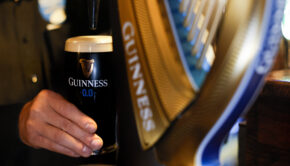In the papers this week 8 – 14 Aug 2009

Fine Gael drafts Food (Fair Trade and Information) Bill 2009; Tánaiste publishes code of practice proposals for consultation; Paul Foley announces departure from Aldi
13 August 2009
Fine Gael has drafted the Food (Fair Trade and Information) Bill 2009, which would make it illegal for retailers to demand “hello money” from suppliers. FG spokesman Michael Creed estimated that €160 million was paid by suppliers in order to ensure their products get a place on shelves, although they also were not likely to admit this in case they lost the shelf as a result. The Irish Times reports that the bill requires all terms of retail transactions to be recorded, and it would be mandatory.
The supermarket price war and troubles between retailers and suppliers has led Tánaiste and Minister For Enterprise And Employment Mary Coughlan to publish proposals for the grocery trade, reports the Irish Times. These include a code of practice and possibly an ombudsman to ensure fairness for the retailer, supplier, and especially the customer; and the ban of secret payments bullied out of suppliers. Coughlan’s proposals were put forth to the Irish Small and Medium Enterprises Association and the Irish Farmers Association, which are welcoming all other suggestions by 30 September.
Coughlan’s proposal has yielded mixed reactions, with disapproval coming from Fine Gael over the minister’s “flip-flopping,” continues the Irish Times. Creed accused her of inconsistency in regards to “hello money”: first that it didn’t exist, then that it wasn’t a problem, and now proposing to ban it. Others appreciate the proposals tenets, especially the suppliers and small businesses, while some like Retail Ireland worry that the customer’s benefit may be forgotten in the plan.
Irish Times columnist Paul Cullen also addressed the issue of “hello money” and determined its abolition would be to the consumer’s advantage.
Paul Foley, who has for the last 20 years been the UK and Ireland director of Aldi, has left the company abruptly, being replaced by Armin Burger. Aldi announced that the change was made in “mutual consent” with Foley, but a reason for his departure was not given, reports the Irish Independent. Burger was previously general director of operations at the discounter’s Austria branch and a member of the company’s growth team.
The National Off-License Association has reported that several supermarkets have been breaking a code on alcohol display by placing them in regular aisles rather than confining them to off-licenses. The code was put in place three months ago after Justice Minister Dermot Ahern attempted to completely ban general alcohol displays, but multiples asked for a lesser policy. Now, NOFFLA has photographic evidence that a number of major supermarkets have been placing beer and wine next to non-alcoholic products. Although no stores have specifically been named, the Irish Independent notes that Dunnes Stores did not agree to the voluntary code.
In order to target mounting food waste, British supermarkets are being advised to stop offering two-for-one deals, which account for a reported one-third of waste, according to UK watchdog Wrap. “Bogofs” (buy-one-get-one-free) don’t consider single-person households, which are being encouraged to buy more than they can consume and are contributing to waste. In response, reports the Times Online (UK), The Department for Environment, Food and Rural affairs is suggesting bogofs on only non-perishables and printed advice on how to preserve food longer.
In the same vein, UK environment minister Hilary Benn has made a number of suggestions on how to reduce household food waste, reports the Daily Telegraph (UK). His advice includes using ‘best before’ as more of a guideline than an absolute in judging whether food is still safe to eat; understanding label meanings better; choosing seasonal vegetables over imported; and growing vegetables at home. It comes as part of Britain’s adjusted food strategy, which aims to increase the country’s self-sustainability to avoid population crises in later years.
According to the Financial Times, US retailers are taking a leaf from Europe by becoming more selective in product displays and making way for own-brand products. For instance, Wal-Mart’s “win, play, show” approach aims to increase sales at existing stores by cutting back less popular retail lines by as much as 15%. The move benefits national brands with strong market shares but not smaller companies, and Wal-Mart branded items can create the same tensions with suppliers as are occurring in Europe. Some suppliers who have already had their products unexpectedly removed from shelves say it was very unexpected.
Greencore, the Irish food group that provides some Weight Watchers meals and makes sandwiches for supermarkets, forecourts, and airlines, are confident they will continue to have a strong year, with 1.3% increase in shares and over 55% increase in stocks so far. The company attributes the success to warming UK weather and sentiment, and predicts that although the sterling to Euro value is still difficult, it will be able to meet market expectations this year.
The Sunday Business Post has a feature on Tesco’s ‘change for good’ campaign, observing that although the store has been sometimes regarded unfavourably, Tesco feels the programme has been worth the price cuts. Since May, they say they have gained an extra 25,000 new customers each week, and expect 100,000 once every Irish store has made the change. Marketing director Kenny Jacobs also addresses the low numbers of Irish products in Tesco, slogan quarrels, and the move from ad flyers to the web.
The average price of living continues to fall all over Ireland, reports the Central Statistics Office, with the country now in its ninth consecutive month. The 12 months prior to July had seen a drop of 5.9%, 0.8% of that occurring in July itself. Food and drink prices came down 4.2% in the month, although alcohol and tobacco has risen 7.7%.
Cork drink distribution firm Barry & Fitzwilliam is planning an expansion into the North, reports the Irish Examiner. Managing director Michael Barry, said the firm, which distributes brands such as Corona and Boru Vodka, could potentially be operating in the North by the end of the year.
Bread maker McCambridge swung into the red last year with pre-tax losses of almost €900,000 but the company insists it will be profitable again in the next two years, reports The Irish Examiner. Company director Michael McCambridge said the loss in the year to the end of July 2008 was down to two exceptional items –the revaluing of assets and the purchase of Inter Link Foods.
Listed Irish Agrifood and Beverages (IAB) companies are performing substantially better than other market sectors during the downturn. New research shows eight IAB companies have added 32% to their collective stock market value since February 2009. Four have delivered very strong performances – with C&C, up 129%; Fyffes, up 95%; Total Produce, up 75%; and Origin Enterprises, up 59%.
Following yet another store ram-raid using diggers; Gardai have revealed they are considering using GPS tracking devices to pinpoint the location of stolen ATMs and introducing a dye which would destroy notes inside the cash machine if it was opened illegally. Officers have also placed surveillance on suspected key members of up to three gangs involved in at least seven ATM thefts and other ram-raids on shops.
A retail outlet is closing on average every day amid warnings 32,000 more jobs will be lost in the sector, reveals The Irish Examiner. According to figures compiled by InsolvencyJournal.ie, 30 retail outlets closed last month compared with 21 in June and 11 in May. However, stores located at the border have seen an average 30% increase in sales as a result of Tesco’s campaign and the opening of IKEA in Dublin.



 Print
Print






Fans 0
Followers